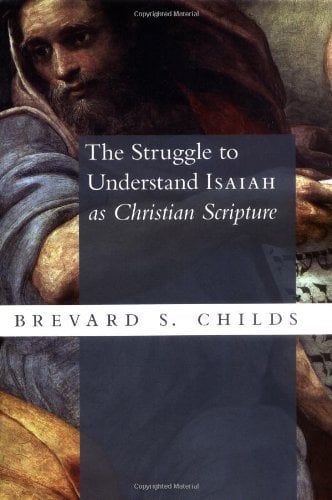F. Delitzsch (1813-90) was indeed a major commentator on Isaiah and other OT books and he spent much of his life learning and interacting with rabbinic literature on the Bible. He was involved in a project to translate the NT into Hebrew, and his knowledge of Judaism was profound. He was an orthodox Lutheran who wrote volumes on messianism, and was a confessional Christian theologian. Delitzsch agreed with Hoffmann about Heilsgeschichte encompassing both the OT and the NT, culminating in Christ, but he did not see it as an organic process that developed independently of the human response. He accepted the notions of typology as a way of viewing the patterns in the text and spoke of a series of fulfillments. His exegesis is characterized by detailed philology, attention to historical aspects of the text, but he eschewed Hoffmann’s philosophical speculations.
While previously he had affirmed one author for all of Isaiah, in the last edition (1894) of his commentary he allows for two. He even says he had always treated Is. 40-66 as addressed to exiles (but Childs says this doesn’t make sense, since earlier he affirmed one author). He talks about Isaiah’ spirit, or Doppelganger living amongst the exiles producing Is. 40-66. He says first and second Isaiah were not joined together by accident, for the later chapters are a continuation of Isaiah’s prophecy equal in quality and value. The book is in any case the result of impulses springing from Isaiah himself. The book has a consistent eschatological message from the promised Messiah to the suffering servant to the Christological fulfillment in Christ and the NT.
Interestingly he also sees Is. 24-27 as not being written by the historical Isaiah but by a disciple of his “who… surpasses his master”. In his view the common themes in the two major parts of the book show the continuity of the prophetic message in spite of multiple authorship. While Delitzsch allows that Israel is the servant corporately speaking, when one gets to Is. 52-53 there is an individual spoken of who is distinguished from his people. “Is..52.13-53.12 proclaims the suffering and resurrection of Jesus Christ as clearly as if the prophet stood under the cross and had seen the resurrected One.” Childs offers one more famous quote from Delitzsch “Without the New Testament, the Old Testament would be a labyrinth without a clue, a syllogism without a conclusion, a torso without a heart, a moon without a sun, since Christ is the proper interpreter of the Old Testament” (from an article entitled “Must We Follow the New Testament Interpretation of the Old Testament Text,” in The Old Testament Student, 6 (1886-87), pp.77-78).













